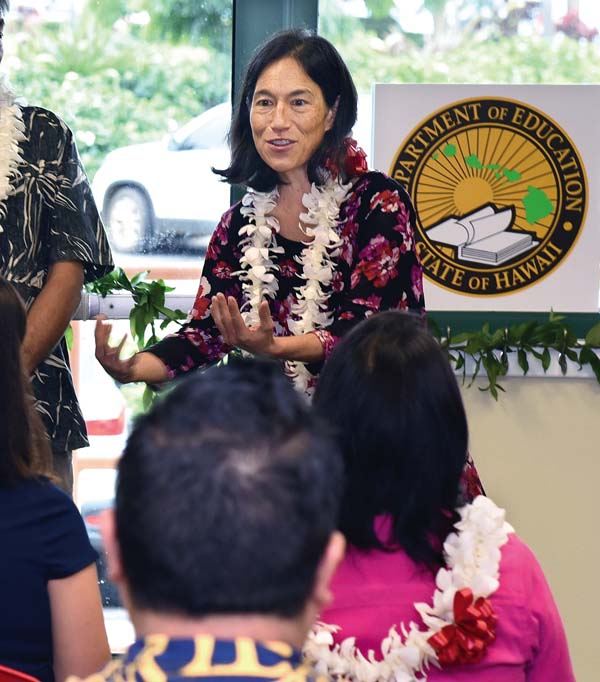Center to help ease students with disabilities into mainstream
Blessing for intensive school: First-of-its-kind facility for Maui will assist students with autism

Kahu Kealahou Alika of Makena’s Keawala‘i Congregational Church blesses the staff of the state Department of Education’s Po‘okela Maui in Kihei on Friday morning. The Maui News / MATTHEW THAYER photo
Po’okela Maui, a state Department of Education center to help students with substantial communication, social and behavioral needs, including autism, will accept its first students in January, officials said this week.
On Friday, the Department of Education hosted a blessing of the center at the Maui Research and Technology Park in Kihei. The Maui Economic Development Board is leasing space to the center.
This is the first center of its kind for the department on Maui. Another such center was opened this school year on Oahu, said Ruth Ballinger, the Maui center’s administrator.
Nearly $400,000 has been allocated to the opening of the center, she added.
Po’okela Maui is dedicated to public school students who may temporarily require an intensive and focused program to learn communication, social and behavioral skills to be successful in a regular public school setting, Ballinger said.

Po’okela Maui Administrator Ruth Ballinger explains how the state Department of Education facility for helping students will be a joyful and happy place. “We’re going to help them grow and learn here in a happy way,” she said Friday. The center to help students with substantial communication, social and behavioral needs, including autism, will accept its first students in January. The Maui News / MATTHEW THAYER photo
Students with autism and other developmental disabilities sometimes experience anxiety and become frustrated when they do not have basic problem-solving skills, perseverance, flexibility and independence, program officials said.
“Po’okela Maui is designed to provide these students with a controlled, low-distraction environment together with highly trained teachers and paraprofessionals that can speed up learning,” said Ballinger, the Baldwin-Kekaulike-Maui Complex’s autism educational specialist.
The center can address the needs of six to eight students at a time, depending on the students’ needs, Ballinger added.
According to the DOE, students who qualify for the program will be temporarily placed at the center for three months to a year. The goal is to get students up to speed and ready for a regular classroom environment.
For now, the center’s main focus will be on intermediate school students.

Maui County Mayor Alan Arakawa speaks about the importance of helping students find and develop what they are good at doing. The Maui News / MATTHEW THAYER photo
“This is a crucial time for students with developmental disabilities who, like their typical peers, are beginning to formulate their self-identity and must begin to establish relationships with the community at-large,” Ballinger said.
Complex Area Superintendent Leila Hayashida praised the center, saying: “Po’okela Maui supports every principal and teacher’s target of developing independent students and amplifies the meaningful work in our public schools.”
The center took about a year to plan. It consists of one large room, surrounded by several smaller rooms along with a kitchen, Ballinger said.
The Po’okela teaching team designed the center’s interior, with much of the furniture hand-constructed by Chad Takakura, the lead Po’okela teacher. The furniture needs to meet specific standards, Ballinger said.
While the center is key in the students’ learning, Ballinger said students benefit the most from real-life experiences.
The curriculum will have an off-site component. Students will regularly practice what they learn in a variety of community settings.
Not only will students learn, but teachers from the students’ home schools will participate in a training program. They will spend some time at Po’okela learning directly how to implement the programs as well as collaborate with the Po’okela staff on how to carry over the program into their classrooms, Ballinger said.
The site will be staffed by one special education teacher, Takakura, and two autism paraprofessionals, Ballinger added.
Other services include having a part-time speech pathologist and occupational therapist. Counseling or physical therapy will be provided on an as-needed basis.
At the start of next school year, Ballinger anticipates having two full-time special education teachers and three to four paraprofessionals as well as other related service providers.
* Melissa Tanji can be reached at mtanji@mauinews.com.
